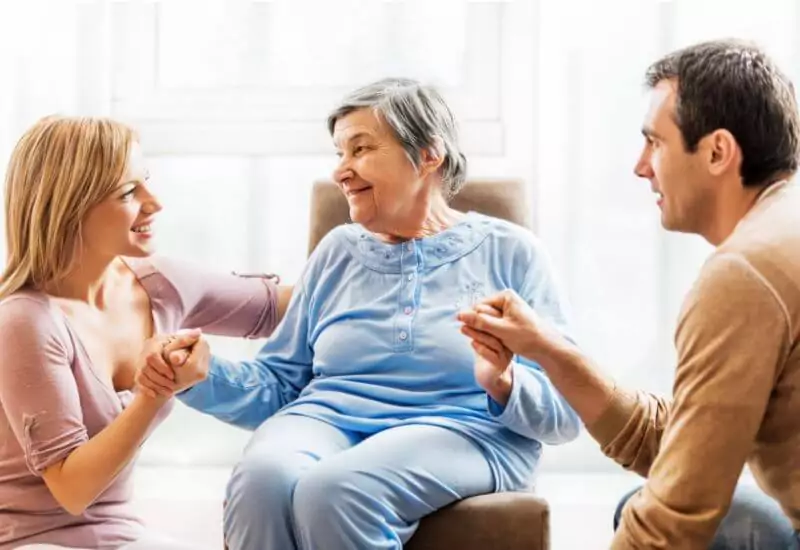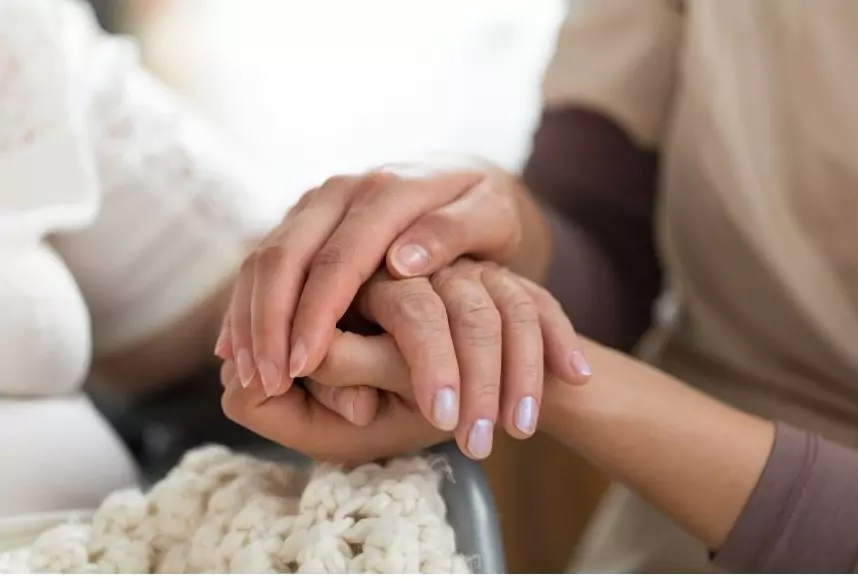With nearly 10,000 baby boomers reaching retirement age every day, the demand for caregivers increases each year. According to a report from Families Caring for An Aging America, at least 17.7 million individuals in the U.S. are caring for an older adult with various health needs. For many families, this responsibility often falls on a family member, such as a spouse or an adult child. In fact, data suggests that more than half of older adults between the ages of 85 and 89 require a family member’s help because of health or other functional issues. However, many older adults require help much sooner than this. Other conditions which are common among older adults such as Alzheimer’s disease, stroke, heart-attack or heart-disease, and fall-related injuries can result in needing assistance with basic daily tasks. Sometimes the need for assistance is quite obvious and other times it can go unrecognized for long periods of time.
For long-distance adult children, it can be difficult to know when a parent needs extra support. Many older adults either learn how to hide their condition or don’t want to burden their children with asking for help. It’s not uncommon for adult children to be surprised by their parent’s condition after going long periods of time without visiting, especially due to the COVID-19 pandemic. It’s even more common for adult children to wonder why their parent isn’t asking for help when they need it.
Why isn’t your parent asking for help?
Whether your loved one is experiencing normal age-related forgetfulness or decreased mobility, it might come as a surprise when they don’t ask for help. However, there are a number of reasons why parents hesitate to ask their adult children for assistance:
- Denial. As humans, we can rationalize any situation no matter its severity. Even if your loved one is experiencing changes in their memory or physical health, they may not have accepted these changes yet. Instead, your parent might be placing blame on others around them.
- Cognitive decline. When adults develop Alzheimer’s or dementia, they may not realize that they are putting their safety at risk. In addition, it’s not uncommon for those with memory conditions to hide their symptoms from their loved ones.
- Fear of losing autonomy. Oftentimes older adults worry that receiving more care and assistance results in a loss of independence. They might fear losing the ability to drive, take care of themselves, or live in their home independently.
Understanding the Warning Signs
Whether you’re already noticing signs of declining health in your loved one, or aren’t exactly sure what to look for, there are some common warning signs that can help you identify a problem. The Mayo Clinic has developed a list of signs and symptoms of various health conditions that should spark concern. The next time you visit your loved one, you may consider asking these questions:
Are your parents able to take care of themselves?
Failure to keep up with basic daily routines, such as bathing and brushing teeth, could be a sign of depression, dementia, or other physical impairments. The next time you’re with your parents, pay attention to their physical appearance. In addition, any changes in the way your parents do things around their home could also provide insight into their health. Are they paying the bills on time? Are the dishes clean? Neglecting housework or having problems buying groceries could also be signs of depression or dementia.
Are your parents experiencing memory loss?
It’s common for older adults to experience sporadic forgetfulness, however, there is a difference between these normal changes and memory loss that interferes with daily life. Warning signs of abnormal memory loss can include: asking the same questions repeatedly, getting lost in familiar places, not being able to follow instructions, and becoming confused about time, people and places.
Are your parents safe in their home?
Take a look around your parents’ home and look for anything out of the ordinary. Are they able to refill their medications and take them consistently? You may consider looking around for any fall hazards or signs they have recently fallen.
Are your parents safe on the road?
If your parents become confused while driving or you have concerns about their ability to drive—especially if you have noticed any new scratches or dings in their vehicle, it might be time to have a conversation about driving alternatives.
Have your parents lost weight?
Losing weight without trying could be a sign that something is wrong. Weight loss can be related to many different factors including difficulty cooking, loss of taste or smell, social issues and underlying conditions such as malnutrition, dementia, depression, or cancer.
Are your parents still social?
If your parent is neglecting their normal social activities, it could be a sign of depression or dementia. If you notice your parent withdrawing from their hobbies or avoiding their friends, it may be time to address your concerns.
Next Steps
If you’ve noticed any warning signs in your loved one, it can be difficult to know what to do next, especially if you live cross-country or far away. However, there are many steps you can take to ensure your parent is getting the support and care they need. Here are a few ways to get started:
- Consider a CCRC. Continuing care retirement communities are great options for older adults who want access to different levels of care in one place. CCRCs offer independent living, assisted living and skilled care nursing. These are also great options for couples who prefer to age together, especially in situations where one spouse requires more care than the other.
- Share your concerns. Talk to your parents about your concerns and ask them to visit their health care provider. If you are long-distance, you may ask a trusted friend or family member to accompany them.
- Address immediate safety concerns. If you notice any threats to your parents’ health or safety, such as malnourishment or fall-hazards, it’s important to address these first. This might include hiring additional support, such as a personal care attendant, or installing grab bars around the home.
- Contact your parent’s healthcare provider. If your parents dismiss your concerns, it may be time to seek help from their healthcare provider. Sharing your concerns with their doctor will help them look for warning signs at their next appointment or conduct assessments to diagnos memory loss or other conditions. You parent may be more open to hearing feedback from a trusted doctor or other healthcare provider.
At Maple Knoll Communities, our main priority is the health and safety of our residents in all levels of care. We work together with family members to provide support, address concerns, and offer peace of mind. If you’re interested in learning more about our offerings or to schedule a tour, please contact us.





